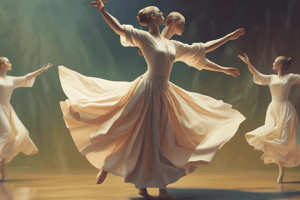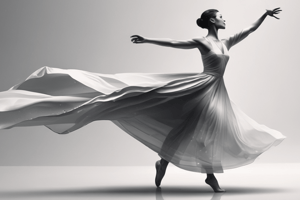Podcast
Questions and Answers
What is a key characteristic of contemporary dance?
What is a key characteristic of contemporary dance?
- Strict adherence to choreographic structures
- Adherence to traditional dance styles and techniques
- Rigid body positions and technical precision
- Fluid, dynamic movements with a naturalistic quality (correct)
How does contemporary dance differ from ballet in terms of body alignment?
How does contemporary dance differ from ballet in terms of body alignment?
- Contemporary dance has more relaxed and flexible body positions (correct)
- Contemporary dance requires more precise and controlled body positions
- Contemporary dance has more rigid body positions
- There is no difference in body alignment between contemporary dance and ballet
Which of the following is NOT a key characteristic of contemporary dance?
Which of the following is NOT a key characteristic of contemporary dance?
- Emphasis on improvisation and experimentation
- Incorporation of floor work
- Adherence to a fixed technical vocabulary (correct)
- Multidisciplinary approach
Which philosophical movement has had a significant influence on the development of contemporary dance?
Which philosophical movement has had a significant influence on the development of contemporary dance?
How has technology impacted the development of contemporary dance?
How has technology impacted the development of contemporary dance?
What is a key focus of contemporary dance in terms of movement quality?
What is a key focus of contemporary dance in terms of movement quality?
What is the main purpose of choreography?
What is the main purpose of choreography?
Which dance form emphasizes freedom from set forms and creativity?
Which dance form emphasizes freedom from set forms and creativity?
In which ancient civilizations was dance a significant part of religious ceremonies and social gatherings?
In which ancient civilizations was dance a significant part of religious ceremonies and social gatherings?
What marked the emergence of contemporary dance during the mid-20th century?
What marked the emergence of contemporary dance during the mid-20th century?
What distinguishes contemporary dance from traditional dance forms?
What distinguishes contemporary dance from traditional dance forms?
Which artistic discipline encompasses various styles like ballet, modern, jazz, hip-hop, and contemporary dance?
Which artistic discipline encompasses various styles like ballet, modern, jazz, hip-hop, and contemporary dance?
Flashcards are hidden until you start studying
Study Notes
Choreographic Forms: An Exploration into Contemporary Dance
Choreography is the art of creating movement, often set to music, with dancers within the context of a theatrical performance. It is the expression of human emotions and experiences through movement, which can be accompanied by music, costumes, scenery, and other visual aids. The study of choreographic forms is a significant aspect of dance, particularly in the realm of contemporary dance, which has evolved from traditional dance forms and is characterized by its freedom from set forms and its emphasis on creativity and innovation.
Origins of Choreography
The origin of choreography can be traced back to ancient civilizations such as Greece and Rome, where dance was a significant part of religious ceremonies and social gatherings. Over time, choreography has evolved to become a distinct artistic discipline that encompasses various styles and genres, including ballet, modern, jazz, hip-hop, and contemporary dance.
Contemporary Dance: A Brief History
Contemporary dance emerged during the mid-20th century as a fusion of various dance genres, including classical ballet, jazz, modern dance, and ethnic traditions. It marked a departure from traditional dance forms by emphasizing creativity, authenticity, and a rejection of established techniques. Key figures in the development of contemporary dance include Martha Graham, Merce Cunningham, Alvin Ailey, Paul Taylor, and many others who pushed boundaries and challenged conventions.
Characteristics of Contemporary Dance
Contemporary dance is defined by its versatility, freedom, and lack of fixed technique. It combines elements of different dance styles, allowing it to express emotions, tell stories, evoke reactions, and explore new ways of moving within space. Some key characteristics of contemporary dance include:
- Movement quality: Contemporary dance focuses on the execution of movements rather than their quantity. Movements are fluid, dynamic, and have a naturalistic quality.
- Body alignment: Dancers' body positions are less rigid and more relaxed compared to ballet. This allows for freer expression and greater flexibility.
- Floor work: Contemporary dance often involves floor work, which means dancers perform close to the ground, exploring different angles and perspectives.
- Improvisation and experimentation: Contemporary dance encourages improvisation and exploration, pushing the boundaries of what is possible through movement.
- Multidisciplinary approach: Many contemporary dance works incorporate elements from other arts disciplines, such as visual art, theater, literature, and film.
Influences on Contemporary Dance
Contemporary dance has been influenced by various factors, including cultural shifts, technological advancements, and the works of visionary artists. Some of the most significant influences on contemporary dance include:
- Postmodernism: This philosophical movement questioned traditional values and structures, leading to a shift in how dance was perceived and created.
- Technology: Advancements in technology have enabled the creation of innovative stage designs, lighting effects, and multimedia integrations that enhance the performance experience.
- Social issues: Contemporary dance has reflected and responded to societal changes and challenges, addressing themes like gender, race, and identity.
In conclusion, choreographic forms play a crucial role in shaping the dance world, particularly in the context of contemporary dance. By embracing innovation, challenging conventional norms, and incorporating diverse influences, contemporary dance continues to evolve and push the boundaries of artistic expression.
Studying That Suits You
Use AI to generate personalized quizzes and flashcards to suit your learning preferences.




